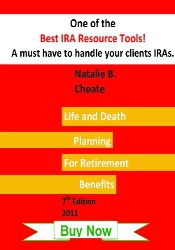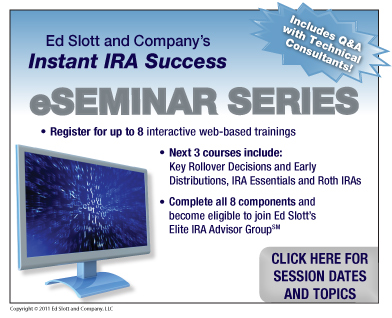
In This Update:
- Key Focus: Unmarried Couples
and New Federal
Estate Tax
- Ruling to
Remember: The 60-
Day Rollover Rule
- Q of the Month: Do I
Have to Take an RMD
if Still Working?
Resources
- Ed as a Speaker
- Ed Slott's IRA Advisor Newsletter
- Shopping Cart
- Discussion Forum
- IRA Resources
- IRA and Tax Tables
Assistance
?? Question of the Month: Do I have to take a Required Minimum Distribution if working?
Q: If you have worked any part of the year that you turn 70 1/2, what are the requirements for taking Required Minimum Distributions (RMDs) for that year?
A: If you have a traditional IRA, you must start taking RMDs at age 70 1/2 regardless of whether you continue to work or not. In the year you turn age 70 1/2, you can take your RMD by December 31 or defer it until April 1 of the following year. You must take every subsequent RMD by year-end. The good news for Roth IRA owners is that there are no RMDs.
If you participate in a company-sponsored plan and you are not a 5% or greater owner of that company, the plan may not require you to take RMDs until you retire. If you retire at any point in 2011, you will have to take a distribution for 2011 from the plan assets.
THE EARLY BIRD GETS NEW BUSINESS!
REGISTER BEFORE THE LARGEST IRAS PASS YOU BY
GROUP DISCOUNTS AVAILABLE! CONTACT US AT 877-337-5688 FOR MORE INFORMATION
When the 2-Year Deal is Not Really a 2-Year Deal
|
The April issue of Ed Slott's IRA Advisor Newsletter lets you know when a deal is not really a deal. Many individuals chose to go through with a Roth conversion in 2010 because income and filing status restrictions were repealed and because of a special tax-break called the 2-year deal. Instead of including all the income from a 2010 conversion in 2010, clients can choose to split the income equally over 2011 and 2012. However, sometimes events that occurred after the conversion can alter the 2-year deal or elimate it altogether. What are these events? |

|
FIND OUT WHEN A 2-YEAR DEAL ISNíT A DEAL IN ED SLOTTíS IRA ADVISOR NEWSLETTER | |
Inside Ed Slott's IRA Advisor NewsletterWhen the 2-Year Deal is Not Really a 2-Year Deal
Advisors' 2011 Roth IRA Questions Answered
Guest IRA Expert
If you are not already an Ed Slott's IRA Advisor Newsletter subscriber, you can preview past issues before subscribing. |
|
|
||
|
|||






 April Key Focus
April Key Focus Ruling to Remember
Ruling to Remember